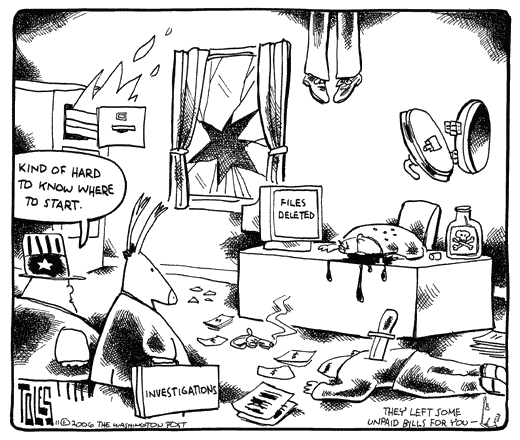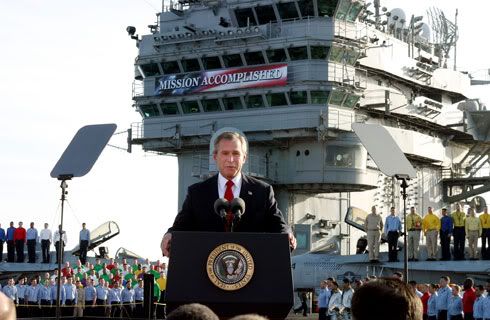So much news, one doesn't know where to begin. Let's start with the scary stuff.
First up, a
major problem threatening to unravel the barely-stable Iraqi government: "Radical anti-U.S. Shi'ite cleric Moqtada al-Sadr's political bloc, a key player in Iraqi Prime Minister Nuri al-Maliki's government, threatened on Friday to withdraw from the cabinet and parliament if Maliki met U.S. President George W. Bush as planned in Jordan next week."
Hmmm, methinks that is not going to end well.
The Iraqis, however, used to all the carnage in their streets as a daily reality,
call for calm-
Sunni, Shiite and Kurdish leaders called Sunday for an end to Iraq's sectarian conflict and vowed to track down those responsible for the war's deadliest attack.
But as they went on national television to try to keep Iraq from sliding into an all-out civil war, fighting between Iraqi security forces and Sunni Arab insurgents raged for a second day in Baqouba, the capital of Diyala province north of Baghdad...
This, of course, is beyond our control.
A curiosity hit me today as I was thinking... what would be the top issues of the day today had our leaders
not put us on the path to war in Iraq four years ago? What would the last three elections have been about? What would be the top focus of Congress' energies? What would I be blogging about right now? Something to ponder. Unfortunately, such pondering is a luxury our leaders cannot afford.
The President, for instance, is
on a diplomatic frenzy, looking for any help he can get.
This past weekend in Iraq, for the record, was
a notably horrific weekend, even by current standards. Hundreds of people were killed in the past few days alone, with some even being burned alive. Is it a coincidence that the violence grows more and more the longer our occupation continues? A question that answers itself.
The NY Times
has a report on how the "insurgency in Iraq is now self-sustaining financially".
And CNN's John Roberts
explains the reality of Iraq to Howard Kurtz.
Glenn Greenwald, full of fact-fueled rage as usual,
reminds us that the President and his defenders tried to spin away the violence last month, claiming it was only a short-term thing meant to influence our election. I'm sure they have a new spin in place to place the blame for all of this at everyone's feet but their own.
With Al-Sadr making a power play in Iraq and Jordan’s King Abdullah warning that "the problems in the Middle East go beyond the war in Iraq and that much of the region soon could become engulfed in violence unless the central issues are addressed quickly", Firedoglake's Christy Hardin Smith
wonders why anyone thinks they stand to gain by tying their anchors to this mess (particularly stubborn U.S. politicians)-
In the end, who is served by being the King of Chaos? And who will reap the benefits of this whirlwind spinning out of control and reaching its tentacles of death and destruction further and further outward in the region? Beyond the war profiteering and the no-bid contracts, who benefits from George Bush's war? The McCains and the Lieberman's of the world cannot back down now, or they will lose face in their own minds, seemingly, based on their recent statements and actions. The Bush Administration certainly is not going to admit an error — heaven forbid. We have created our own worst nightmare, and worse, we did it without any provocation from Iraq other than the stubborn public statements of a madman which were used to justify the actions of a hotheaded President bent on revenge and one-upsmanship on his Daddy.
Somewhere, in the mountains of Afghanistan or Pakistan, Osama Bin Laden is smiling.
Amen.
Any politician who cares about their political future would do well to admit failure (yes, it is okay to do that) and immediately begin a) finding a way out of Iraq, and b) completely rethinking our approach to the Middle East crisis. We haven't done the latter in a long time. Let's start now, before it's too late.
Finally, with The President Formerly Known as The Decider
handing over his decision making duties on Iraq to the Baker Commission, few (even among the Democrats) seem to to be questioning the seriousness of this. Former National Security Adviser Zbigniew Brzezinski, however,
is. He says that while the commission "will probably come out with some sound advice on dealing with the neighborhood," it essentially "will offer some procrastination ideas for dealing with the crisis." Sounds like an accurate prediction to me.
Ohh, and by the way, the Iraq war
has now outlasted U.S. involvement in WWII. Good night.




